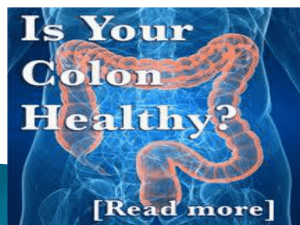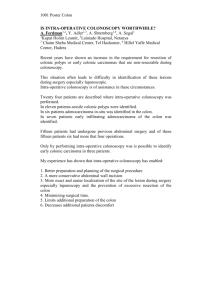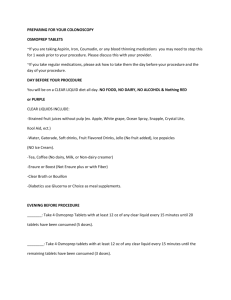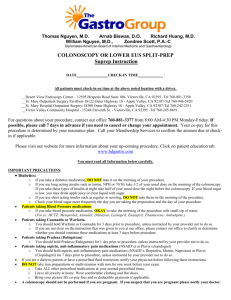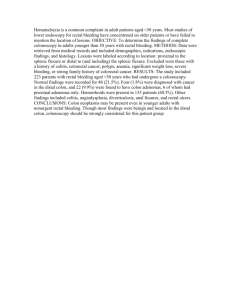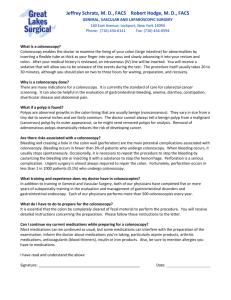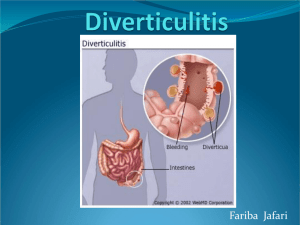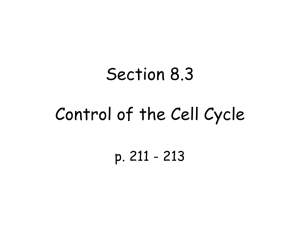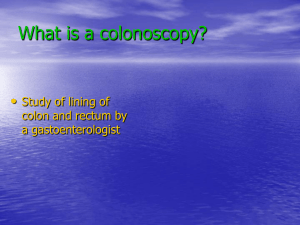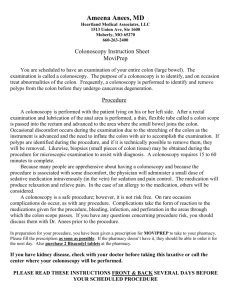`Colon Cancer: Yes, We`ll talk.` chat here
advertisement
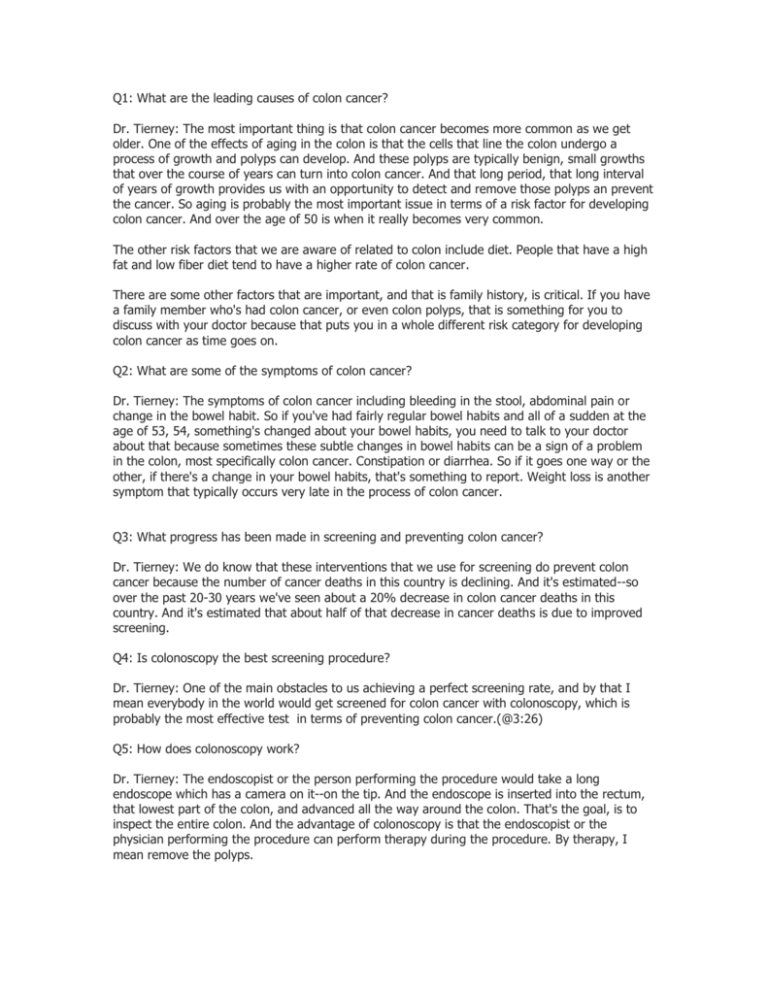
Q1: What are the leading causes of colon cancer? Dr. Tierney: The most important thing is that colon cancer becomes more common as we get older. One of the effects of aging in the colon is that the cells that line the colon undergo a process of growth and polyps can develop. And these polyps are typically benign, small growths that over the course of years can turn into colon cancer. And that long period, that long interval of years of growth provides us with an opportunity to detect and remove those polyps an prevent the cancer. So aging is probably the most important issue in terms of a risk factor for developing colon cancer. And over the age of 50 is when it really becomes very common. The other risk factors that we are aware of related to colon include diet. People that have a high fat and low fiber diet tend to have a higher rate of colon cancer. There are some other factors that are important, and that is family history, is critical. If you have a family member who's had colon cancer, or even colon polyps, that is something for you to discuss with your doctor because that puts you in a whole different risk category for developing colon cancer as time goes on. Q2: What are some of the symptoms of colon cancer? Dr. Tierney: The symptoms of colon cancer including bleeding in the stool, abdominal pain or change in the bowel habit. So if you've had fairly regular bowel habits and all of a sudden at the age of 53, 54, something's changed about your bowel habits, you need to talk to your doctor about that because sometimes these subtle changes in bowel habits can be a sign of a problem in the colon, most specifically colon cancer. Constipation or diarrhea. So if it goes one way or the other, if there's a change in your bowel habits, that's something to report. Weight loss is another symptom that typically occurs very late in the process of colon cancer. Q3: What progress has been made in screening and preventing colon cancer? Dr. Tierney: We do know that these interventions that we use for screening do prevent colon cancer because the number of cancer deaths in this country is declining. And it's estimated--so over the past 20-30 years we've seen about a 20% decrease in colon cancer deaths in this country. And it's estimated that about half of that decrease in cancer deaths is due to improved screening. Q4: Is colonoscopy the best screening procedure? Dr. Tierney: One of the main obstacles to us achieving a perfect screening rate, and by that I mean everybody in the world would get screened for colon cancer with colonoscopy, which is probably the most effective test in terms of preventing colon cancer.(@3:26) Q5: How does colonoscopy work? Dr. Tierney: The endoscopist or the person performing the procedure would take a long endoscope which has a camera on it--on the tip. And the endoscope is inserted into the rectum, that lowest part of the colon, and advanced all the way around the colon. That's the goal, is to inspect the entire colon. And the advantage of colonoscopy is that the endoscopist or the physician performing the procedure can perform therapy during the procedure. By therapy, I mean remove the polyps. Q6: What does a patient need to do to prepared for a colonoscopy, and is it painful? Dr. Tierney: For a colonoscopy a patient should expect to take the day off from work or whatever their other activities are. The day prior to the procedure they have to take some medication to cleanse the colon so that the inspection can be as effective as possible. That's-- most patients when you talk to them, when they come in for their procedure, and they're done with the procedure, what-- 90% of them say that's the worst part of their procedure, is having to go through the preparation of cleaning the colon. The day of the procedure is typically--it's in a hospital or an ambulatory endoscopy center. And the procedure does almost always involve sedation, so the patient has an IV placed, they are given a combination of medications both to take away discomfort and to sedate them--make them more relaxed. With that combination of medications, the vast majority of the patients get through the procedure without recognizing it. Without any discomfort. Q7: How often should you have a colonoscopy? Dr. Tierney: Now if you don't have a family history and you have a colonoscopy at age 50 and it's normal, then ten years is the recommended time to repeat that. Now with a family history, again it gets really into the details of what the family history is. But if you friend's brother had a colon cancer under the age of 60, and he or she had a colonoscopy and it's normal, then typically it's every five years with that family history. Q8: If the colonoscopy finds cancer, what happens next? Dr. Tierney: If a colonoscopy diagnosed cancer, hopefully it's been diagnosed in the early stage. And the next step would be to go through some testing to help determine what the state of that cancer was. And that would usually require a CAT scan of the abdomen to look at the liver and also to see if there's any sign that the cancer has spread to other organs. If that cancer has not spread to other organs, almost always the next step is going to be surgery of the colon to remove that segment of the colon that has the cancer in it. When that surgery is done, some further information is gained as a result of inspecting or examining, from a pathology standpoint, the cancer. And that information can then be used to determine if chemotherapy is necessary. So that's a fairly typical sequence of events. There are some patients that if we catch it early enough and do surgery, that's it. They're done. They're cured from their cancer. They would still need to have surveillance and monitoring over time to make sure the cancer doesn't come back and also to have colonoscopies on a much more frequent interval because now they've got, developed cancer, they're at a much higher risk of getting cancer again in the future and in other parts of their colon.
